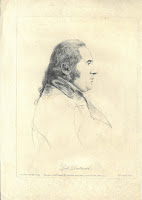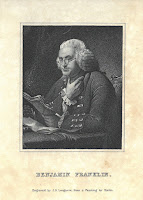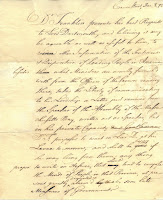This week, we welcomed to Special Collections a visiting delegation of Rotarians from the United Kingdom. First editions of works by Austen, Dickens, and Shakespeare were on display for them, as well as historic Rotary Club publications and a few items connected to the college's namesake. William Legge, the second Earl of Dartmouth, was the leading trustee for the English trust that funded Eleazar Wheelock's initial educational venture, Moor's Charity School. In an an effort to drum up financial support for the founding of Dartmouth College, Wheelock named the school after Legge. Wheelock hoped that the nobleman would be flattered and respond with a generous donation; Lord Dartmouth declined the invitation to contribute.
In addition to his connection to America through Moor's Charity School, the Earl of Dartmouth had
another important tie to the colonies. From 1772 until 1775, he served as the United Kingdom's Secretary of State for the Colonies; the position had been newly created in 1768 to bring the American colonies to heel after the passage of the controversial Townshend Acts in 1767. Among the items we had on display for our British guests was a letter written (or, at least, dictated) by Benjamin Franklin to Lord Dartmouth in December 8th, 1772. In his letter, Franklin states that he would like to share his perspective on the general sentiments of "leading people in America" with Dartmouth, particularly their concerns about recent measures taken by the British government. Franklin suggests that Dartmouth may not be receiving a true account from his official government representatives in America.
At this time, Franklin was living in London. He had originally moved there as a representative of the Pennsylvania Assembly to protest the influence of the Penn family. However, over the two decades
that he was there, his role soon morphed into a defender of the colonies at large, including the Massachusetts Colony. He became well known in London political circles in particular for his vehement rejection of the 1765 Stamp Act. In 1772, Franklin was writing to Lord Dartmouth because he had recently come into ownership of a packet of letters written by the current Governor of Massachusetts, Thomas Hutchinson, that both recommended strengthening executive power in the colonies and asserted that colonists would never have the same full rights that they would enjoy if they still lived in England. That very same month, Franklin would send those letters to the Massachusetts Assembly. Six months later, they were published widely in America and served to fuel the fires of rebellion.
To read Franklin's letter to Lord Dartmouth and see the engraving of him, come to Special Collections and ask for Ticknor 772658.1. To see the engraving of Lord Dartmouth, ask for Iconography 741.



No comments:
Post a Comment